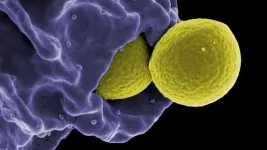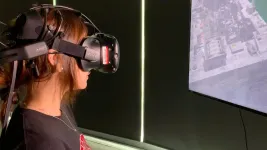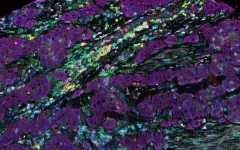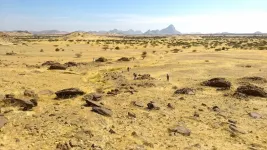Where were the men, they wondered? More than 75% of all tenured faculty in Ph.D. programs around the world are men, making their participation key to solving the problem of gender bias, which negatively impacts the careers, work-life balance and mental health of all women in science, and even more so for minority women and members of the LGBTQ+ community.
"If they are not on board, and they don't feel that this is also their fight, then nothing will change," Llorens said.
That was only one of the incidents that led the two women to round up 45 men and women from 40 institutions across 10 countries and 18 nationalities, divide them into small groups and task them with scouring the literature for practical tips -- proven and unproven -- on how best to counteract all aspects of gender bias in academia. The study, with Llorens and Tzovara as first authors, appears today in the journal Neuron, and provides a comprehensive summary of the many forms that gender bias takes, along with a checklist that individuals, lab leaders, university administrators, journal editors and grant reviewers at funding agencies can use to remedy them.
Both women thank their mentor, Bob Knight, a UC Berkeley professor of psychology and neuroscience in the HWNI, for his enthusiastic support of women researchers and of their project, which they admit was substantially different from their main fields of research: how the brain deals with language and conscious perception of the environment. But as the two women transition to the next stages of their careers -- Tzovara, originally from Greece, left two years ago to become an assistant professor at the University of Bern in Switzerland, while Llorens, who is French, is finishing up her postdoctoral research at UC Berkeley -- they wanted to leave a legacy for women who follow them in neuroscience.
In a Q&A, Llorens and Tzovara talk about their motivations and the problem of gender bias in the ivied halls.
What drove you to undertake this year-long project?
Llorens: The starting point was at the end of 2019, when we went to a neuroscience conference, a big one, and we talked with many of our women colleagues and realized how many of us were struggling to find a correct balance between having a family, a life, and also finding a permanent position. In science, you often have to move abroad, for most of us in Europe, especially, and it is a long process before you can settle down and find a permanent position.
Then, at this very same conference, we attended a workshop on how to strive as a woman in neuroscience, and we really felt the discrepancy between what we were actually living as scientists and what the panelists were telling us. There were five successful women who managed to have a perfectly balanced life, with 300 women listening. When we came out of the room, we felt like we were the issue, because, obviously, they made it. Maybe we are the problem?
Tzovara: There is this notion of survivorship bias -- often we look at people who have made it, and we forget all the people who did not have a straightforward career path and are not there yet. That helped us to identify this gap between what others described, and what we experienced ourselves, and realize that the more we talk about bias, the more interest we find from men and women. That is why we wanted to give voice to all these discussions that we had among ourselves and write them down, hoping that these will be the beginning of a bigger conversation.
Llorens: After that workshop, I felt that had I wasted my time, because nothing will change by simply listening to successful women, if I may say so; we need more than that to actually see some improvements. That is why, for us, it was important to have as many men on board in this project who felt concerned and also wanted to fight for equity. It is something we need to discuss together.
Hasn't the situation improved for women in STEM fields over the past generation?
Llorens: Absolutely. We can really see improvement in many aspects of science. In many countries, between 20% and 25% of women are professors. We can also see progress in preventing sexual harassment. It is better, but we are far from equity. It is still not safe enough and still not equal enough.
Tzovara: I've observed improvements even in the last five or 10 years. These days, if there are conferences that have men-only panels, they will be called out. If there are journals where the editorial board is composed exclusively of men, they will be called out. So, there is concrete change compared to some years ago. I think it might be like a cascade effect -- the more we talk about bias, the more people are aware of it, the more we can realize that we need to take action. All this together has the power to bring positive change.
Llorens: But now some people think, "Ok, there is some improvement, so maybe we don't need to work as hard to make things better." And that is a problem, because equity won't just come magically; we need to keep working on it. And that is also an issue when we talk to people and they say, "It's better, it is just a matter of time." No, it isn't, actually. It is a matter of people making that change. We still need actions to make things right. There is progress, for sure. We are moving in the right direction. But we need to keep making the effort.
You provide many suggestions, but one is having a gender target in grants to improve equity, which some people -- women, as well as men -- might object to in the same way that people have objected to affirmative action for people of color.
Llorens: We advocate for a more equitable distribution of funding. Funding agencies should make an extra effort to insure a fairer distribution of the resources between genders. That said, during my career, I was hired through a grant promoting diversity by potentially hiring a woman, and I must admit when I read that I wondered, "Did I get the job because I was the best applicant or because I was a woman?" That is the tricky thing with positive actions: We still need them, as academia is still imbalanced for now, but we must somewhat force it. But I also had to work on my own self-esteem to understand that this is the way that things have to be done. It is not because I am not good, but it is just because we have to make things right.
Tzovara: Sometimes it is just about giving the right opportunities to people who are not traditionally represented in academia and then giving them some space. And that can often be enough by itself to let individuals that are traditionally underrepresented shine.
Do men suffer from the same pressures when trying to succeed in academia?
Tzovara: That reminds me of a discussion we had with one of our men co-authors who was trying to understand the way that women experience science. He, too, felt that he had experienced similar issues: difficulties moving abroad or difficulties with his family. But as women, we experience it much, much worse. Sometimes bias and discrimination or micro- and macro aggressions pile on top of the usual challenges associated with working in science.
Llorens: Biology is different. Men don't feel the same pressure as we do because, for us, literally, everything happens at the same time. In this window between 28 and 36 years of age, we need to find a position, but this is also when we have to be the most mobile, and it is the right age to build a family. For men, they can wait. It is challenging for everyone to keep relationships, but it is not the same pressure.
If you had to prioritize the most important interventions for reducing gender bias, where would you start?
Llorens: There are existing tools that people can use to mitigate bias pretty easily. For instance, regarding equitable citations in journal articles or in syllabi for teaching. These are easy actions that can be taken right now to make things better, and they are already known to be valuable.
For me, the biggest challenge, and I think the most impactful, would be to change mindsets. Everyone needs to be on board with this topic to make real change. If men are on board, then we will have allies at the top, because most of the leaders are men. We also need more action around sexual harassment. Stopping sexual harassment is everyone's job, of course, but the leaders need to be strict and clear with sexual harassment policies; they have to lead by example. Change has to come from the top. It is really important to make the working environment safe.
Tzovara: There are so many different things that we can do, and I think everybody should do both the smaller and the larger things. If they see injustice or bias, they should speak up. If someone is representing an institute, like a university or funding agency, they should make sure that the work of the institute represents equity. They should make sure that funding is equally distributed, that the institute doesn't only hire men, that promotions take gender bias into account, and so on. If someone has the power to change society and change mindsets, they should start working on that. And that is the message we tried to convey with this manuscript, where we split the suggested solutions into three levels of individual, institutional and societal to show that everybody has a responsibility, depending on their position and abilities.
Llorens: And also removing the burden that we have as women. On top of having to represent ourselves as women, we have to be part of committees and to add some extra work to represent women in science. If we can have everyone on board, meaning everyone advocates for underrepresented groups, even though they are not part of a one of those groups themselves, then the burden will be shared, and it will become easier for everyone. For me, that will be the most impactful action, for everyone to be more aware of these issues and take a stand and help us with that.
I also think that transparency is key. For instance, institutions must be transparent regarding negotiations, such as about the scale you can ask for salaries. The institution has to make things easier for everyone to navigate academia, to be honest. And because most of the biases are implicit, we need to call them out and make them explicit because many people think that they are not biased. I feel like I, too, am part of the problem. I have my own biases, everyone has their own bias. But I think acknowledging them, making them explicit, is also a step forward that people need to take.
How would you characterize UC Berkeley's response to gender bias?
Llorens: I think the way that they advertise now for positions -- making it mandatory to have women applicants -- is a good step forward. It means that the department has to actually do research when they are hiring for a position. When we talk now with students about gender bias, some of them are worried that if we do that, it means that we might need to go for someone who is not the best candidate. When I mentioned this to Bob Knight, who has been part of recruiting committees for many, many years, he said that the fact that you actually have to look for a broader pool of people you might not have thought of before was actually a good thing, that they never, ever chose someone that wasn't the top choice. For him, it didn't change the way he was recruiting people, it only diversified and increased the pool of subjects. The best candidate was offered the job. It just might not have been the best person they thought about before.
Also, in the past few years UC Berkeley has done a good job of increasing awareness of sexual assault and sexual harassment. The kinds of services and help offered by the university, including the Path to Care Center, for example, I found really interesting. Not all institutions have that. I also would add that UC Berkeley has really tried to raise awareness about women in science this year with the emphasis on 150 Years of Women at Berkeley. It is always important to try to raise awareness of this topic.
But UC Berkeley is a bubble.
Tzovara: And the lab we were in is a bubble within a bubble. I think I speak for a lot of people in the lab that we felt secure that, if something happened, Bob would have our backs. It is very important for members of any institution or individual lab to know that their mentors have their backs and speak up when they see injustice.
Llorens: You know the imposter syndrome -- it impacts women and men, but mostly women. When you have a PI who makes sure you are in a safe environment and makes you feel like you can do it, it helps a lot. It is not like that in many places, to be honest with you. Bob and Nina Dronkers (an adjunct professor of psychology who also is a co-senior author of the paper) were wonderful mentors.
How did you put together these checklists?
Tzovara: We wanted to base the paper on data. We read a lot -- we have almost 300 references in the paper -- and tried to back up everything with science and describe what worked and what didn't in remedying gender bias. We wanted to give examples of which of the proposed solutions can work and have been actually tested, and which are implemented in some parts of the world, but may still have uncertain results. The goal is to start from there and see what can be done to improve things on the individual, institutional and societal level.
What are your hopes for this paper?
Llorens: We want this paper to be disseminated widely and across different borders in academia. We are also now giving workshops at various scientific meetings and talking to undergraduate students.
Tzovara: Other activities that we plan to pursue include organizing mentoring seminars for women in science. One of the next steps is to also reach out to even younger ages. We would like to start talking about bias to young students in schools when their mindsets are still being shaped, in order to have an impact on the next generation.
Llorens: Gender bias is a sensitive topic, but we just want to get the discussion rolling. Hopefully, we can do a follow-up study in five years and say which suggestions worked to mitigate gender bias, and keep making progress on that topic so that we will end up with a checklist that each lab can refer to.
INFORMATION:





